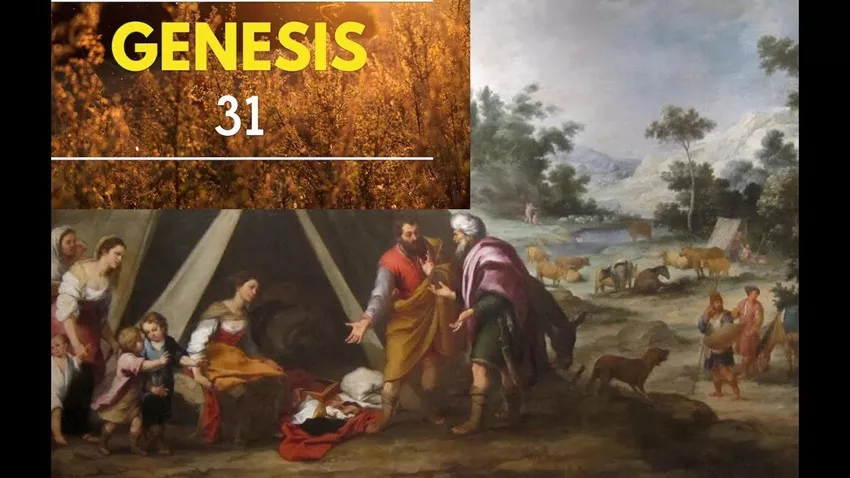Genesis Chapter 31 Summary
Genesis Chapter 31 details Jacob‘s decision to leave Laban’s household after years of working for him. After noticing that Laban’s attitude toward him has changed and feeling a divine prompting, Jacob gathers his family and livestock secretly. He confronts Laban, who is away shearing sheep, and Rachel steals her father’s household gods. Upon Laban’s return, he pursues Jacob and confronts him, accusing him of theft. Jacob defends his actions, stating he left out of fear and highlights his years of hard work and the blessings of God. Laban and Jacob eventually make a covenant, marking their agreement with a stone heap as a witness. They part ways amicably, with Laban blessing his daughters and Jacob. This chapter illustrates themes of divine guidance, family loyalty, and the importance of establishing boundaries and agreements in relationships.
Bible Genesis Chapter 31
Welcome to read Genesis Chapter 31. Here is the list of Genesis Chapter 31:
What Does Genesis Chapter 31 Teach Us?
1. The Importance of Divine Direction
God’s Command to Jacob: In Genesis 31, God instructs Jacob to return to his homeland. This highlights the significance of seeking and following divine guidance in our lives. Jacob’s willingness to listen to God’s voice demonstrates the importance of being attuned to God’s direction, especially during times of uncertainty.
Obedience in Unfamiliar Circumstances: Jacob’s departure from Laban’s household signifies his obedience to God’s call, even though it involves leaving behind the life he had known. This teaches us that following God may require leaving our comfort zones and trusting Him to lead us into the unknown.
2. The Complexity of Relationships
Tension with Laban: Jacob’s relationship with Laban has become strained due to Laban’s deceptive practices and changing attitudes. This tension illustrates the challenges that can arise in personal and professional relationships, particularly when trust is broken.
Communication and Resolution: Jacob’s decision to confront Laban about his grievances demonstrates the importance of open communication in resolving conflicts. It emphasizes that addressing issues directly, rather than avoiding them, can lead to healthier relationships.
3. The Consequences of Deception
Rachel’s Theft of Idols: The chapter reveals that Rachel steals her father Laban’s household gods (teraphim). This act of deception adds complexity to Jacob’s journey and reflects the theme of dishonesty that runs through the narrative. It serves as a reminder that deception can lead to unforeseen consequences and complicate our relationships.
Laban’s Anger and Pursuit: Laban’s pursuit of Jacob highlights the repercussions of deception, as he seeks to confront Jacob over the missing idols. This confrontation illustrates that dishonesty not only impacts the deceiver but can also lead to conflict and strife with others.
4. The Significance of Covenant Relationships
Jacob’s Covenant with Laban: When Jacob and Laban meet, they establish a covenant, setting boundaries for their interactions moving forward. This act underscores the importance of formal agreements in relationships, emphasizing accountability and mutual respect.
Commitment to Peace: The covenant represents a commitment to peace and harmony, even in the face of past grievances. This teaches us that pursuing reconciliation and setting clear boundaries can foster healthier relationships and prevent future conflicts.
5. God’s Protection Over His People
Divine Intervention: As Jacob flees from Laban, God protects him by warning Laban in a dream not to harm Jacob. This demonstrates God’s faithfulness and protection over His people, assuring us that God watches over us during times of transition and difficulty.
Confidence in God’s Provision: Jacob’s experience serves as a reminder to have confidence in God’s provision and protection. Knowing that God is actively involved in our lives can give us the courage to face challenges and navigate difficult situations.
6. The Role of Prayer and Worship
Acknowledgment of God’s Faithfulness: Jacob’s journey back to his homeland is marked by moments of prayer and worship, reflecting his gratitude for God’s guidance and protection. This highlights the importance of maintaining a relationship with God through prayer, particularly during significant life changes.
The Impact of Worship on Our Journey: Jacob’s commitment to worship emphasizes the role of spiritual practices in grounding us during transitions. Regular worship and prayer can help us remain focused on God’s faithfulness and provide strength in times of uncertainty.
Conclusion
Genesis Chapter 31 teaches vital lessons about divine direction, the complexity of relationships, and the consequences of deception. Through Jacob’s experiences, we learn the importance of open communication, the significance of covenant relationships, and God’s unwavering protection over His people. By reflecting on these teachings, we can foster healthier relationships, seek God’s guidance, and maintain a strong connection with Him as we navigate the complexities of life.
Related topics:

